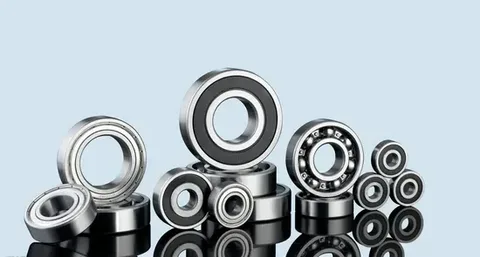Did you know ball bearings keep countless machines running smoothly every day? From heavy trucks to precision tools, these small components play a big role in reducing friction and boosting efficiency. This blog explores the versatile applications of ball bearings, their types, benefits, and how to choose the right one. Readers will learn about key industry players with insights into their offerings. Whether you are curious about ball bearing uses or need guidance on selection, this post covers it all.
Rolling Smoothly: How Ball Bearings Power Diverse Applications
Ball bearings are essential components in many industries. They reduce friction, support loads, and ensure smooth motion. Their versatility makes them vital for various applications, especially in commercial vehicles.
What Are Ball Bearings?
Ball bearings are small, spherical elements housed in a raceway. They allow rotational movement with minimal friction. These components are used in everything from vehicle wheels to industrial machinery.
- Deep Groove Ball Bearings: Handle radial and axial loads; common in motors.
- Thrust Ball Bearings: Support axial loads; used in steering systems.
- Angular Contact Ball Bearings: Ideal for combined loads; found in pumps.
- Self-Aligning Ball Bearings: Adjust to misalignment; used in conveyors.
- Miniature Ball Bearings: Small, precise; perfect for electronics.
Key Industries Using Ball Bearings
Ball bearing applications span multiple sectors. Each industry relies on specific types to meet unique demands.
- Automotive: Wheel hubs, transmissions, and engines.
- Aerospace: Landing gear and turbines.
- Manufacturing: Conveyor belts and robotic arms.
- Agriculture: Tractors and harvesters.
- Electronics: Hard drives and cooling fans.
Benefits of Ball Bearings
Ball bearings offer several advantages. They enhance performance and durability across applications.
- Low Friction: Reduces energy loss.
- High Durability: Withstands heavy loads.
- Versatility: Fits diverse machinery.
- Easy Maintenance: Simple to lubricate.
- Cost-Effective: Long lifespan lowers replacement costs.
Ball Bearing Uses in Commercial Vehicles
In commercial vehicles, ball bearings are used to ensure reliability. They support heavy loads and high speeds, critical for trucks and buses. KG India excels in providing bearings tailored for these demanding applications.
Challenges in Application
Improper selection or maintenance can lead to bearing failure. Overloading, poor lubrication, or contamination often cause issues. Choosing the right ball bearing type and maintaining it properly are key to avoiding problems.
Spin It Right: Choosing the Perfect Ball Bearing for Your Needs
Selecting the right ball bearing ensures optimal performance. Factors like load, speed, and environment guide the decision. This section outlines how to make the best choice.
Understand Load Requirements
Load type and magnitude determine bearing suitability. Radial loads act perpendicular to the shaft, while axial loads act along it.
- Radial Loads: Use deep groove ball bearings.
- Axial Loads: Choose thrust ball bearing uses.
- Combined Loads: Opt for angular contact bearings.
- Heavy Loads: Select bearings with higher load ratings.
- Light Loads: Miniature bearings may suffice.
Consider Speed and Precision
High-speed applications need bearings with low friction. Precision bearings suit sensitive equipment like medical devices.
- High-Speed: Use ceramic or hybrid bearings.
- Low-Speed: Standard steel bearings work well.
- Precision Needs: Choose bearings with tight tolerances.
- Vibration Control: Self-aligning bearings reduce shake.
- Noise Reduction: Low-noise bearings for electronics.
Factor in Environmental Conditions
Harsh environments demand specialized bearings. Dust, moisture, or extreme temperatures affect performance.
- Corrosive Environments: Stainless steel bearings resist rust.
- High Temperatures: Use heat-resistant materials.
- Contaminated Areas: Sealed bearings prevent debris entry.
- Wet Conditions: Waterproof seals protect bearings.
- Extreme Cold: Low-temperature lubricants are essential.
Maintenance and Lifespan
Proper maintenance extends bearing life. Regular lubrication and inspections prevent wear.
- Lubrication: Use grease or oil as recommended.
- Cleaning: Remove dirt and debris regularly.
- Monitoring: Check for unusual noise or heat.
- Replacement: Swap out worn bearings promptly.
- Storage: Keep bearings in dry, clean conditions.
Consulting Experts
For complex applications, consult bearing suppliers. KG India offers expert guidance for commercial vehicle bearings, ensuring the right fit for specific needs.
From Wheels to Machines: The Versatile World of Ball Bearings
Ball bearings are used to increase efficiency across industries. Their adaptability makes them indispensable. This section explores their role in various systems.
Bearings in Automotive Systems
In vehicles, ball bearings support critical components. They ensure smooth operation under heavy loads.
- Wheel Hubs: Enable smooth wheel rotation.
- Transmissions: Reduce friction in gear shifts.
- Engines: Support crankshaft and camshaft motion.
- Steering Systems: Thrust ball bearings aid control.
- Suspension: Handle dynamic loads.
Industrial Machinery Applications
Factories rely on ball bearings for consistent performance. They keep production lines moving.
- Conveyors: Ensure smooth material transport.
- Motors: Reduce energy loss.
- Pumps: Handle high-pressure fluids.
- Robotics: Enable precise movements.
- Turbines: Support high-speed rotation.
Aerospace and Defense
Aerospace demands precision and reliability. Ball bearings meet these strict standards.
- Jet Engines: Withstand extreme temperatures.
- Landing Gear: Support heavy loads.
- Control Systems: Ensure accurate navigation.
- Satellites: Operate in vacuum conditions.
- Missiles: Handle high-speed dynamics.
Agricultural Equipment
Farming equipment faces tough conditions. Ball bearings ensure durability in harsh environments.
- Tractors: Support heavy-duty tasks.
- Harvesters: Handle continuous operation.
- Plows: Reduce friction in soil work.
- Irrigation Systems: Enable smooth pump function.
- Seeders: Ensure precise planting.
Role of Leading Companies
Several companies supply high-quality ball bearings. Their expertise shapes the industry.
- NRB Bearings Limited: Offers a wide range of ball bearings for automotive and industrial uses. Their products are available globally.
- Timken India Limited: Specializes in precision bearings for heavy industries. They provide reliable solutions for diverse applications.
- KG India: Focuses on commercial vehicle bearings, offering robust solutions. Their bearings excel in high-load, high-speed conditions.
KG India stands out for its deep expertise in commercial vehicles. Their bearings are designed for durability and performance in trucks and buses. Compared to NRB Bearings and Timken India, KG India’s specialized focus ensures tailored solutions for heavy-duty applications. While NRB and Timken offer broad portfolios, KG India’s commitment to quality and innovation makes it a strong choice for vehicle-specific needs.
Conclusion
Ball bearings are vital for countless applications, from commercial vehicles to industrial machines. They reduce friction, support loads, and enhance efficiency. Choosing the right bearing involves understanding load, speed, and environmental factors. Proper maintenance ensures long-lasting performance. Industry leaders like NRB Bearings Limited, Timken India Limited provide reliable solutions, but KG India’s expertise in commercial vehicle bearings makes it a trusted partner for heavy-duty needs. For those seeking durable, high-quality bearings, exploring options at KG India offers a great starting point. Invest in the right ball bearing to keep your operations running smoothly.


